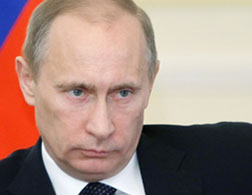Why Is Vladimir Putin Going to Katyn?
By Anne Applebaum
Slate.com, April 5, 2010
"In this era of commerce and trade, it often happens that countries that might once have gone to war play out their antagonisms through other means. ... In Central Europe, the outstanding example of this phenomenon is the ongoing discussion of the Katyn massacre, the memory of which continues to shape the relationship between Poland and Russia. At stake is an event that took place exactly 70 years ago: the Soviet Union's murder of some 20,000 Polish officers in the spring of 1940. The officers had been captured by the Red Army, which invaded eastern Poland in 1939, just after Nazi Germany invaded from the west. Soviet secret policemen murdered them on the direct order of Stalin. Later, Stalin switched sides, joined the Allies against Hitler, and blamed the Germans for the officers' murders. That lie remained part of official Soviet and Polish Communist history until communism collapsed and the Soviet Union fell apart.
In 1990, Mikhail Gorbachev, the last Soviet Communist leader, took responsibility for the murders, and in 1991, the first Russian president, Boris Yeltsin, published the archival documentation. Seventy years is a long time: The grandchildren of the officers who died at Katyn are now middle-aged and elderly. Yet only last month, a Russian magazine sued a Polish magazine for 'extremism' and 'anti-Russian sentiments,' because, among other things, it had published historically accurate articles about Katyn. A couple of years ago, a Russian archivist told me that Russian members of parliament had been pressing him to work on the story: They wanted him to prove that the Germans really had committed the murders and that President Yeltsin had faked those archival documents in order to curry favor with the West. In fact, 'Katyn denial' has become, among certain Russian politicians and journalists, a vehicle for expressing anger at Poland's wholehearted embrace of Western institutions and of Western-style democracy -- and this is how Poles understand it. In 2007, a Russian government-owned newspaper printed a nasty review of a Polish movie about the massacres -- Katyn, by Andrzej Wajda -- and Russian cinemas subsequently refused to show the film. Rightly or wrongly, Poles interpreted these decisions as proof that Russia still harbors imperial designs on its neighbors. ... All of which is a roundabout way of explaining why the showing of that film on Russian state television last Friday night was so surprising. All agree that Katyn could not have been shown without the personal agreement of Russian Prime Minister Vladimir Putin. All agree that the timing was not accidental: On April 7, Putin will attend the 70th anniversary commemoration ceremony in the Katyn forest, together with his Polish counterpart. He is the first Russian leader to attend such an event, and this is the first time such a ceremony has had any official Russian state patronage. [...]"
Monday, April 05, 2010
Subscribe to:
Post Comments (Atom)















Yes, showing the film now is surprising. Let us hope that this is an indication of a chnge.
ReplyDeleteLudwik Kowalski, Professor Emeritus,
whose new book–”Tyranny to Freedom: Diary of a Former Stalinist,” and its reviews, are now available at
www [dot] amazon [dot] com
THIS IS NOT A COMMERCIAL ADVERTISING. 100% ROYALTIES AUTOMATICALLY GO TO A SCHOLARSHIP FUND.
Comments will be appreciated, either at the above website or in private. Thank you in advance.
kowalskiL@mail.montclair.edu
P.S.
The first chapter is online at
http://csam.montclair.edu/~kowalski/chapter1.html